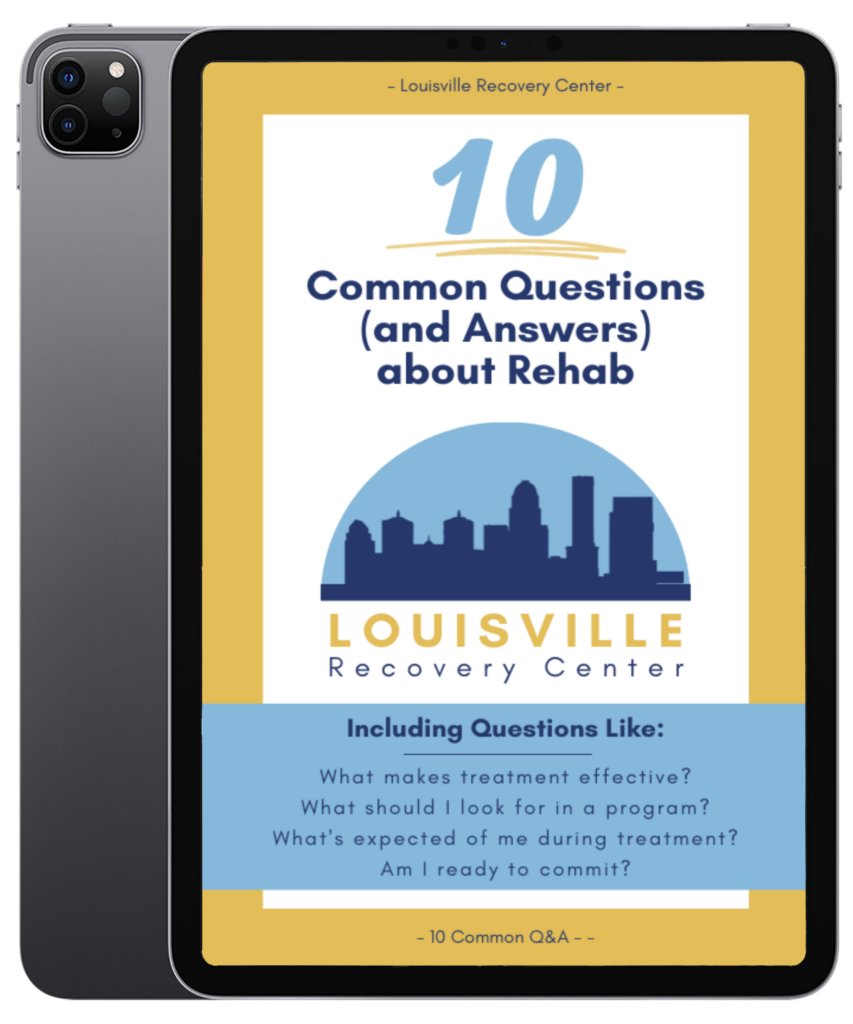Georgetown Addiction Treatment Center
Substance abuse is a serious issue affecting countless families across Kentucky. In 2021, more than 2,250 people lost their lives to overdose, with opioids—particularly fentanyl—playing a major role in these tragic statistics. Unfortunately, methamphetamine and stimulant misuse are also rising in our state, highlighting the urgent need for accessible, professional addiction treatment options.
If you or someone you love is in Georgetown, KY, and seeking support for substance abuse, Louisville Recovery Center is here to help. Even though our facility isn’t right in Georgetown, we’re nearby, ready to provide compassionate, effective addiction treatment. Our programs cover all stages of recovery, so you can find the right support without needing to look far from home.
Addiction Treatment Services for Georgetown Residents
Our team at Louisville Recovery Center offers a range of personalized treatment options to help meet your needs, no matter where you are in your recovery journey. Each of our programs is designed to support you through every stage of recovery. Here are some of the addiction treatment programs available to help Georgetown residents start their recovery journeys:
Medical Detox Services
Detoxing can be one of the hardest parts of the recovery journey, which is why we can connect you with a safe, medically monitored detox environment. At a detox center, medical professionals ensure your comfort and safety as you go through this essential first step, laying the foundation for successful treatment.
Inpatient Rehab Programs
Inpatient rehab allows you to focus solely on recovery in a supportive, structured setting. With access to therapies, skill-building workshops, and round-the-clock care, this program is designed to help you uncover and address the root causes of your addiction.
Flexible Outpatient Programs
For those who need to balance treatment with daily life responsibilities, our outpatient programs provide flexible scheduling options. This means you can attend therapy sessions and receive ongoing support while still managing work, family, or school commitments. Our outpatient programs include our partial hospitalization program (PHP) and intensive outpatient program (IOP). Outpatient care is a great option if you’ve recently completed an inpatient program and want extra support as you transition back to everyday life.
Dual-Diagnosis Treatment
Addiction and mental health often go hand in hand. Our dual-diagnosis program treats both aspects simultaneously, offering a comprehensive approach to recovery. This can be especially beneficial for those dealing with anxiety, depression, PTSD, or other mental health concerns alongside addiction.
Aftercare and Long-Term Support
Recovery doesn’t stop after treatment ends. Our aftercare program ensures you have access to continued support through counseling, group therapy, and resources like sober living options. We’re here to help you build a stable foundation for long-term success.
Teen Program
At Louisville Recovery Center, we offer an IOP for teens to help adolescents aged 12 to 17 overcome addiction. Our therapies and group work helps set teens up for success in recovery.

Fill Out This Quick Form To Download Our FREE 10 Q&A About Rehab eBook
Admissions Process for a Georgetown Addiction Treatment Center
The admissions process at an addiction treatment center is designed to make your transition into recovery as smooth and supportive as possible. Here’s a breakdown of each step in the admissions process, from initial contact to the first day of treatment.

Initial Contact and Inquiry
The admissions process usually begins with a phone call or online inquiry, where you’ll connect with an admissions specialist. This initial conversation is an opportunity for you to ask questions about the center’s programs, insurance, costs, and logistics. Admissions specialists are trained to answer questions about treatment options, the length of stay, and specific services available, such as detox, inpatient, outpatient, or dual-diagnosis treatment.
Example questions you might ask:
- What types of treatment do you offer?
- How long do most people stay in the program?
- Is detox included, if necessary?
- What will the first few days look like?
Insurance Verification and Financial Planning
After the initial inquiry, the admissions team will usually ask for your insurance information. They’ll contact your insurance provider to verify what aspects of the treatment plan are covered and determine your financial responsibility, if any. If you don’t have insurance or your insurance plan doesn’t cover certain aspects of care, the admissions team will work with you to explore alternative payment options, including financing or payment plans.
Common insurance and financial questions include:
- What will my out-of-pocket expenses be?
- Are there financing or payment plans available?
- Can I use more than one type of insurance?
Pre-Admission Assessment
Once financial details are confirmed, you’ll undergo a pre-admission assessment. This assessment is usually conducted over the phone or online with a licensed intake counselor. The assessment helps the clinical team understand your unique needs, including your substance use history, mental health background, physical health, and any medications you’re currently taking. This information is crucial for building a personalized treatment plan.
Assessment questions may cover:
- Your history of substance use and the types of substances
- Mental health conditions or symptoms
- Medical history, including medications and allergies
- Your personal goals for treatment
Selecting a Treatment Program
Based on the pre-admission assessment, the admissions and clinical teams will recommend the best program for your needs. Options may include detox, inpatient residential, outpatient treatment, or a dual-diagnosis program if you have co-occurring mental health conditions. The goal is to match you with a program that aligns with your recovery goals, schedule, and level of support needed.
Treatment program options typically include:
- Detox for safe withdrawal under medical supervision
- Inpatient residential treatment for intensive support and structure
- Outpatient treatment for those who need flexibility to balance treatment with other responsibilities
- Dual-diagnosis programs for individuals with co-occurring mental health conditions
Scheduling Admission and Preparing for Arrival
After selecting a treatment program, you’ll schedule a specific admission date. The admissions team will provide you with a checklist of what to bring (and what to leave behind), any necessary paperwork, and information on logistics. If you’re traveling from out of town, they may assist with transportation arrangements, such as airport pick-up or directions to the facility.
Example items to pack:
- Valid ID and insurance card
- Comfortable clothing and toiletries
- Prescription medications in their original packaging
- Any approved personal items
Pre-Admission Medical Screening (If Required)
Some centers require a brief medical screening or clearance before admission to ensure safety and readiness for treatment. This screening could involve a physical exam or basic lab work, especially if detox is part of your treatment plan. The center may also review vaccination records or health history to safeguard all clients’ well-being.
Arrival and Intake Process
On the day of admission, you’ll arrive at the facility and go through an in-person intake process. The admissions team will meet with you to complete any remaining paperwork, review program guidelines, and answer any questions you may have. You’ll also receive a tour of the facility to get familiar with your new surroundings.
During intake, expect to:
- Confirm personal details and finalize any paperwork
- Review facility guidelines and program schedules
- Meet members of the treatment team and learn about daily routines
Orientation and Personalized Treatment Plan
After intake, you’ll begin an orientation to help you feel comfortable and ready to start treatment. This orientation often includes meeting with your assigned therapist or counselor, who will guide you through your personalized treatment plan based on your goals and needs. You’ll also have an opportunity to learn about the therapies, support groups, and activities available to you.
Your personalized treatment plan may include:
- A schedule of individual and group therapy sessions
- Specific therapies or activities based on your needs (e.g., cognitive behavioral therapy, art therapy)
- Introduction to peer groups and support meetings
Meeting Your Peers and Joining the Community
Finally, you’ll have a chance to meet other clients and staff members in the program. This step is designed to make you feel part of a supportive community from day one. Often, treatment centers host welcome groups or orientation sessions to help new arrivals connect with peers who are also on the path to recovery.
Opportunities for community building may include:
- Group meetings or welcome circles
- Social events or icebreakers to connect with others
- Introductions to staff and program mentors
Settling In and Starting Your Recovery Journey
After orientation, you’ll dive into the daily schedule of treatment, including therapy sessions, educational workshops, and self-care activities. Each day brings a blend of structure and support to help you work toward your recovery goals in a safe, understanding environment. You’ll start building routines and discovering new tools that will serve you on your journey.
The admissions process is about creating a smooth entry into a recovery program, allowing you to feel prepared, supported, and hopeful as you take these first steps. With the right team and a welcoming community, you’ll be set up for a successful, transformative experience in addiction recovery.

Contact Louisville Recovery Center Today
If you’re ready to make a change, Louisville Recovery Center is here to support you. Whether you’re interested in detox, residential rehab, outpatient treatment, or dual-diagnosis services, we have programs to meet your needs.
Let’s take the first step together. Reach out to our admissions team or fill out our online form to learn more about our programs and services. Starting your recovery journey is a big step, and we’re here to make sure you don’t have to take it alone.
